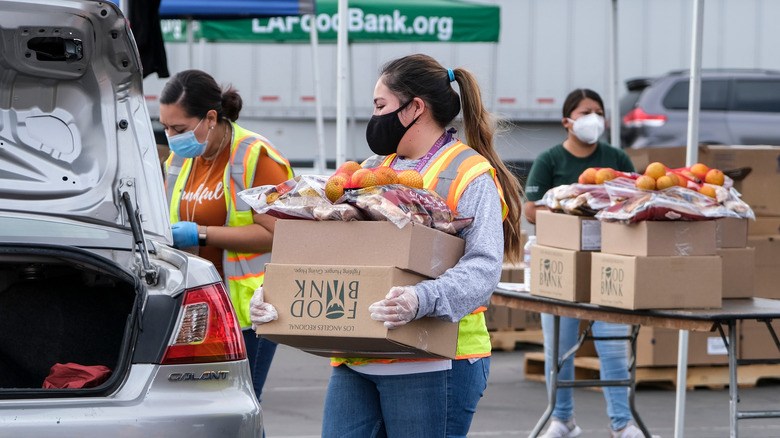Tensions Are Mounting Between Senators And USAID Over Global Food Crisis
The global food crisis has continued to escalate, which poses an immense threat to the world's most vulnerable populations. Meanwhile, tensions between U.S. lawmakers and a major aid agency over the distribution of emergency funds have intensified (via The Washington Post). As the world has grappled with supply chain issues, climate catastrophes, the conflict between Russia and Ukraine, and the ongoing effects of the COVID-19 pandemic in recent months, food shortages — and corresponding international food prices — have hit all-time highs (via The United Nations).
The World Bank, which has emphasized the widespread implications of global food shortages, warned that the continued rise of food prices will potentially "drive millions more into extreme poverty, magnifying hunger and malnutrition, while threatening to erase hard-won gains in development." According to the United Nations' World Food Program, an estimated 345 million people face acute food insecurity worldwide, up from 135 million in 2019. Of the hundreds of millions of hungry global citizens, 50 million are considered to be on the brink of famine.
In response to the ongoing crisis, the U.S. Department of the Treasury recently unveiled a sweeping new plan for combating the global food crisis: the IFI (International Financial Institutions) Action Plan to Address Food Insecurity, which pledged tens of billions of dollars of funding (provided by a group of international financial institutions) to support a diverse range of food and agricultural aid programs (via Reuters).
A group of bipartisan senators criticized the efficiency of the U.S.'s aid distribution
Meanwhile, the U.S. government has taken its own steps to address the ongoing food crisis. Earlier this year, the Senate approved $40 billion in humanitarian and military aid to Ukraine in order to help the citizens of the embattled nation (via The New York Times). According to The United States Agency for International Development, the U.S. has pledged $5.56 billion in aid funds to tackle the global food security crisis since the start of Russia's invasion of Ukraine.
However, according to a vocal group of lawmakers, the United States' financial support for nations and communities hit hardest by the food crisis isn't being distributed quickly enough (via The Washington Post). In a letter sent to USAID administrator Samantha Power, 13 bipartisan senators criticized the organization's handling of aid funds, requesting "an explanation of why such lifesaving aid may take half a year to deliver."
According to USAID representatives, the independent governmental agency will have spent approximately $4.2 billion in humanitarian aid by the end of the current fiscal year in September. In doing so, they're providing aid to a number of nations facing food insecurity, including Somalia, Yemen, Kenya, Ethiopia, and Ukraine.
USAID maintains that relief funds will be distributed through the end of the year
The senators who penned the letter urged the agency to act even more swiftly given the gravity of the ongoing global hunger crisis. "Unless the United States translates well-meaning rhetoric and appropriated dollars into a swift humanitarian response, Russia's crimes against humanity and weaponization of the global food supply will go unpunished," the letter reads (via The Washington Post). "The most significant proposal of humanitarian aid in modern U.S. history must be accompanied by an infrastructure that assumes more prudent risk and quickly delivers support."
Despite these calls for more rapid relief distribution, representatives of USAID shared that the agency plans on distributing all of the pledged aid funding by the end of the year, in order to "maintain a steady infusion of resources into humanitarian programs through the fall and winter when we expect to see the worst effects of the food crisis in many parts of the world."
While it's unclear when — and where — the additional aid money will be allocated, as the food crisis continues to escalate across the globe, funding for food supplies and agricultural programs is needed now more than ever to protect the world's most vulnerable.


